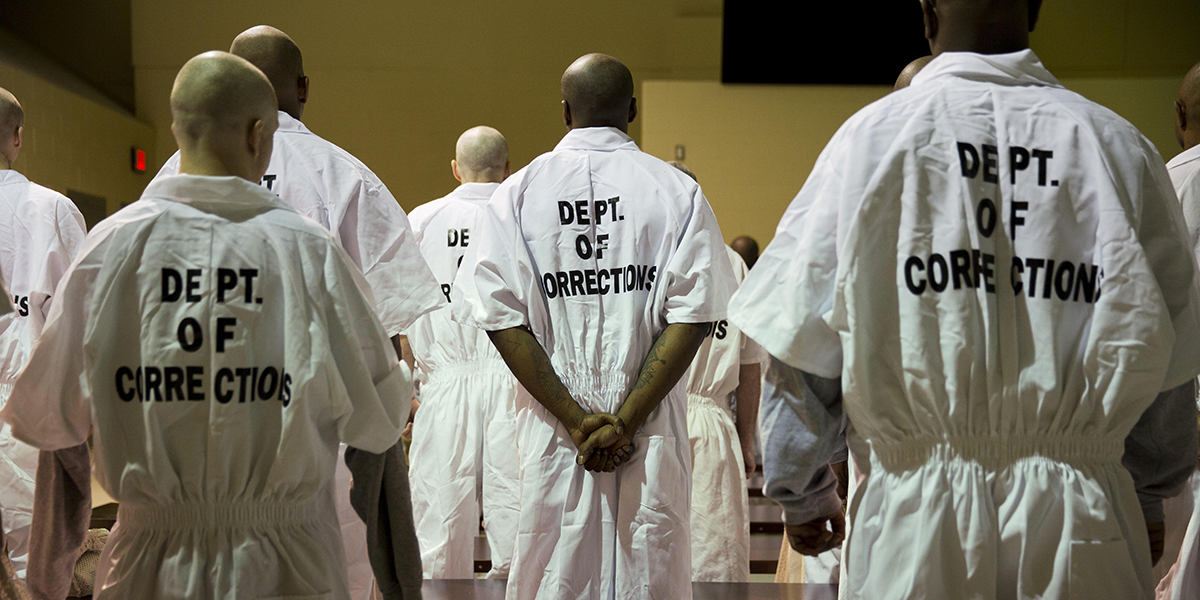Audit Finds Ga.’s Private Probation Contracts Need Updates

Prisoners stand while being processed for intake at the Georgia Diagnostic and Classification Prison, Tuesday, Dec. 1, 2015, in Jackson, Ga. They arrive by the busload each Tuesday and Thursday, dozens of new inmates entering Georgia’s prison system. Most stay only a week or two. But for those sentenced to die, this is their last … Continued
David Goldman / Associated Press
In 2015, after a scathing state audit, Georgia lawmakers passed a set of measures aimed at ending some of the worst practices of private probation companies. A recent follow-up audit recommends a few additional steps could still be taken, but says those new laws addressed most of the original problems discovered.
But some legal advocates say there’s still plenty of problems with Georgia’s system.
Two years ago, state auditors found little oversight for private probation companies operating across Georgia. Many were unfairly extracting fines and issuing unnecessary arrests.
The audit found people were being sent to jail without anyone bothering to ask if they could pay or why they might not be able to report to their probation officers.
That’s according to Matt Taylor, who worked on the first audit. He says in 2015, lawmakers did a lot to fix those issues.
“But there are still some things that the courts and the providers can include in the contracts to provide better direction for day-to-day operations,” he said.
That’s what his office’s recent audit found. Despite the earlier recommendations, a number of the courts they looked at have yet to update contracts spelling out best practices for probation companies.
“It is not ideal,” said Taylor. “It would be helpful if the contracts were revised to include more of these provisions that were recommended in the original audit.”
Taylor said the best way for judges to evaluate probation company performance and ensure there are standard ways to handle probationer non-compliant is to spell them out in contracts. The audit found some courts had taken some steps to follow the contract recommendations. Others had not.
Taylor says the new, follow-up audit was less rigorous and that his office was not concerned that one in three of the 28 courts they reached out to did not respond.
He emphasized that overall, progress has been made. He noted that some of the courts’ contracts had not come up for renewal. Some had been renewed without updated language, but Taylor said his office is satisfied that courts are at least having conversations with probation firms.
“It does take time for the culture to change, for judges to realize the importance of addressing and setting the expectations for providers,” said Taylor. Municipal governments, in addition to judges themselves, bear sole responsibility for making the recommended changes.
“It feels like such a spin. It feels like they’re kicking the can down the road,” said Sara Totonchi, the executive director of the Southern Center for Human Rights. She said the law was a step in the right direction, but the problems from 2014 are nowhere near solved.
Contracts, she said, are not a reliable way to gauge how a probation provider operates on the ground.
“The contract in White County allows drug tests to be imposed only if the court specifically identifies somebody with a drug problem. But what we know in practice is that the company was testing everybody regardless of whether there was an order from the court,” said Totonchi.
She’s frustrated the new audit appears to have eased off as a result of changes in the law.
9(MDAxODM0MDY4MDEyMTY4NDA3MzI3YjkzMw004))








